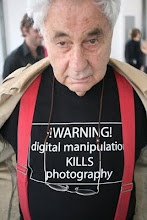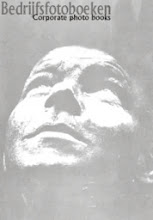
Lees meer ...
The first major retrospective devoted to the Russian photographer, Yevgeny Khaldei, opens in the Martin-Gropius-Bau in Berlin on 9 May 2008. Khaldei, the Russian Robert Capa, provided extensive photographic coverage of the Second World War, the war between Germany and the Soviet Union. Some of his images are world-famous and have become icons in the history of photography. Khaldei is known primarily for his spectacular documentary photos of the Second World War and the staged hoisting of the red flag of the Soviet Union on the top of the Reichstag building in Berlin in 1945, but also for the photos he took at the Potsdam Conference and during the Nuremberg Trials. In addition to these historic images the retrospective shows hitherto unpublished pictures taken by Khaldei as well as photos dating from the 1930s up to the end of his career in the 1980s.
Born in the Donetsk area of the Ukraine in 1917, Khaldei was given his first camera at the age of 13. In 1936 he became a press photographer with the Soviet news agency TASS. He was in action with his camera during the Second World War from 22 June 1941, the day the German armed forces invaded the Soviet Union.
 Khaldei witnessed many battles, from Murmansk in the north down to the Black Sea in the south. As a soldier and photographer he witnessed the retreat of the German troops and documented the advances made by the Red Army on the road to Belgrade, Budapest, Vienna and, finally, Berlin. He worked, with interruptions, for TASS and Pravda up to the 1970s. He died on 6 October 1997.
Khaldei witnessed many battles, from Murmansk in the north down to the Black Sea in the south. As a soldier and photographer he witnessed the retreat of the German troops and documented the advances made by the Red Army on the road to Belgrade, Budapest, Vienna and, finally, Berlin. He worked, with interruptions, for TASS and Pravda up to the 1970s. He died on 6 October 1997.The retrospective, comprising over 200 original photos, provides the first-ever representative selection of Khaldei’s complete works. Khaldei travelled throughout the Soviet Union as a TASS press photographer, taking pictures of dams under construction in Sibiria, the oilfields of Baku and the grain harvest in the Ukraine as well as photos of the political rulers of the time.
The exhibition illustrates the the tension in Khaldei’s work between propaganda and documentation, a critical examination of which is to be found in the exhibition catalogue. Khaldei’s work comprises both freelance photography and commissioned works.
 Khaldei’s images are closely bound up with German history in birographical, historical and aesthetic terms. The exhibition aims to make this connection clear to the general public in both Germany and the Ukraine. As a Jew, Khaldei suffered repeatedly from anti-Semitism; his father and three of his sisters were murdered in 1941 by German soldiers. Taking that into account, it is noteworthy that Khaldei’s work cannot be subsumed unter the heading of propaganda or of heroic Modernism. His photographic eye remained consistently focused on the lives of ordinary people.
Khaldei’s images are closely bound up with German history in birographical, historical and aesthetic terms. The exhibition aims to make this connection clear to the general public in both Germany and the Ukraine. As a Jew, Khaldei suffered repeatedly from anti-Semitism; his father and three of his sisters were murdered in 1941 by German soldiers. Taking that into account, it is noteworthy that Khaldei’s work cannot be subsumed unter the heading of propaganda or of heroic Modernism. His photographic eye remained consistently focused on the lives of ordinary people. All of the photos by Yevgeny Khaldei on display in the exhibition come from the Ernst Volland and Heinz Krimmer collection. They are supplemented by photos taken by his Soviet colleagues. Dimitri Baltermans and Georgi Petrussov.
All of the photos by Yevgeny Khaldei on display in the exhibition come from the Ernst Volland and Heinz Krimmer collection. They are supplemented by photos taken by his Soviet colleagues. Dimitri Baltermans and Georgi Petrussov. The exhibition will subsequently go on show in Kiev. Catalogue Published by Neuer Europa Verlag
The exhibition will subsequently go on show in Kiev. Catalogue Published by Neuer Europa Verlag













Geen opmerkingen:
Een reactie posten